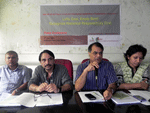Published on Wed, 2013-06-12 00:00
The World Health Organization's head, Dr Margaret Chan, has heavily criticized how big business influences public health by way of a combination of lobbying, litigation and misleading representations of research. Dr Chan's remarks were part of her address to the 8th Global Conference on Health Promotion, held in Helsinki, Finland. Comments such as those made by Dr Chan are rather unusual for UN officials, raising the level of concern with regard to the relationship between public health and big business. |
Published on Wed, 2013-06-12 00:00
From People's Rights to Corporate Privilege: A South Feminist Critique of the HLP Report on Post 2015 Development Agenda The High Level Panel of Eminent Persons Report on the Post 2015 Development Agenda conveys a questionable sense of optimism for women. The report at first appears to have positively responded to the world-wide call from women to have a stand-alone and expanded gender equality goal. There are targets for gender, children and young people across several of the goals, as well as possibilities for indicators on gender, children and young people to be later developed at country level. Sexual and reproductive health and rights is also explicit. |
Published on Thu, 2013-06-06 00:00
In Hungary a system has developed that is disrespectful to both the rule of law and constitutionalism. Hungary has turned against the democratic ideals of the world, civil liberties are restricted and today it is on a declining economic path. Political life is characterized by a murderous policy divergence, confrontation and a dangerous ideology-based polarization. The majority of the society is struggling with unjust and unequal relationships without even the hope offered by mutual solidarity. Hungary's international prestige, integrity and credibility are now at its lowest point. |
Published on Wed, 2013-06-05 00:00
The much awaited High-Level Panel (HLP) Report on the Post-2015 development agenda is deeply disappointing for LDC civil society. While setting the ending of extreme poverty as a core objective, and an aspiration to ensure every person achieves a basic standard of well-being, it ignores existing agreements that focus particularly on the world’s poorest and most marginalised LDCs. The HLP Report ironically gives no “special attention” to the LDCs, as called for in previously agreed development efforts. It is even regressive in the spirit of global partnership, |
Published on Tue, 2013-06-04 21:04
[Dhaka, Tuesday, 4 June 2013] Civil society right groups network EquityBD and VOICE in a press conference held at the city’s national press club criticized United Nation High Level Panel (UN HLP) report on post 2015 agenda terming it “as lofty goal and empty bowl” and said that the report is in fact a far short in transforming economies. The UN HLP report has just published on 30th June 2013 in New York. The UN HLP was co chaired by UK Prime minister Davide Cameron, Indonesian President Dr. Susilo Bambang and Liberian President Alen Johnson Sirlef. Moderated by Rezaul Karim Chowdhury, chief coordinator of Equitybd, the position paper was read out by Ahmed Swapan Mahmud, executive director of Voice. |
SUSCRIBE TO OUR NEWSLETTER







